- Home
- M G Vassanji
When She Was Queen Page 15
When She Was Queen Read online
Page 15
The planchette gives a start.
“Is that you, Raja?” Rusty asks intensely, losing no time.
Pause, then the planchette hops over to the “Yes” box.
“Oh wonderful!” Vina exclaims with relief, and next to Shireen, Ma emits a chuckle.
Rusty continues, “Thank you, Elvis Raja, do you have something to say first?”
Yes. The little heart waddles off to spell out S-O-N-G….
“Song?” Yes. “You’re asking me to sing—you’ll never give up, will you? All right, Raja, I’ll indulge you.”
Rusty gives a quick look around at the others. Then he sings a high-pitched off-tune version of “Crying in the Chapel,” mercifully stopping after a few lines.
“I’m not as good as you, Raja, and you do like to tease me.”
“What else, Raja?” Vina jumps in.
“Hurry up,” Rusty whispers, “you know he doesn’t have much time—he gets hundreds of summonses all the time.”
“Tell us about those men in hoods who harass us so much,” Vina speaks, in a spoiled little-sister voice.
The little heart on the board tilts, then hops along.
“D-O …,” Vina reads out. “Mr. Doris the teacher—okay. Can you tell us of anyone else?… He always gives only that one name,” she whispers to Diamond. “I wonder why….”
The planchette is still. The old woman stirs, mumbles something.
“Okay, Ma,” says Shireen. “Raja, tell Ma how is Manek—her husband and my grandfather.”
She could be talking to a dog in that tone, Diamond thinks.
The heart tips a few times on its legs but declines to spell out a message.
“He is well and sends greetings,” Rusty says, too quickly; then adds: “Well, we know he’s doing well where he is.”
“He’s reborn as a little girl in a fabulously rich household in Mysore,” Shireen says to no one in particular. “Isn’t that what Raja told us the other time?”
“Let’s ask him our question before he leaves,” Rusty says in a low voice, then speaks up, “Okay, here’s the big question, Raja—you can’t sign off without answering this one—”
Vina takes over, sounding anxious: “Should we allow Diamond, our guest, to leave tomorrow morning… or do you think he should stay longer and….” Her grip on Diamond’s hand tightens, he responds instinctively.
Without hesitation the planchette hobbles off energetically on its three legs to spell out S-T-A-Y.
“Stay! That’s unequivocal,” concludes Rusty firmly. “The guest will stay a few days more.”
Diamond feels not only a tight squeeze on his hand but also the bite of a nail. The yellow heart on the board runs off to “Yes,” then starts tilting back and forth and suddenly stops.
“He’s gone,” Rusty says softly, then calls out, “’Bye, Raja. You’re still King and we love you.”
They sit back in their chairs and give a collective sigh. Someone turns the light back to bright. The old woman smiles contentedly, and Shireen is beaming. And Diamond feels duped.
“Well?” Rusty looks around.
“Shall we continue,” Vina says, “or shall I put the tea on?”
The planchette is on the board, Rusty touches it lightly with a forefinger. It jumps.
“Let’s see who it is, I feel the energy, it’s especially high today … must be you, Diamond.”
Sure it’s me, Diamond thinks ruefully.
Rusty dims the light.
“Okay now—pay attention….”
Stillness, again, anticipation, hands held; and the planchette begins to hobble in the false twilight. But it cannot find a resting place. Rusty deals with the presence sternly.
“Who are you? Identify yourself, please. Who do you want to speak to?”
P-E-G … And Diamond’s heart stops. Peggy-Peggy-Peggy, my Peggy-Sue…
“Who’s Peg?” Rusty inquires. “Who do you want to speak to, Peg?”
Vina throws a quick glance at Diamond, says, “No one we know. Sign off then, Rusty.”
They let go their hands.
—I loved you, Di….
—I know, and I loved you too, Sue.
Vina stands up, beaming. “So you’re not going,” she says to Diamond. “I’m so glad.”
“Yes. Raja has spoken,” Rusty says. “You know, once he disputed the content of my course with me—he didn’t like my interpretation of one of his songs. I told him, ‘Lay off, Raja, once an artist’s done his work, it belongs to the audience—and the critic. It’s no longer yours.’ He took no offence.”
Diamond feels he’s been clobbered on the head. Thanks to Raja, he will have to tarry a while longer at this place; but how much longer? He recalls that his car is blocked, and his key is with Vina. Meanwhile she has invited her tall, pretty sister to come and meet him, this nice single man from Toronto, whom she’s also been teasing; if he doesn’t watch himself, he could end up married a second time, living in Chicago and related to the Mehtas. The family, the three adults, must surely have discussed this prospect amongst themselves; Ma already took a proprietorial tone regarding him this morning, talking of fattening him up.
He excuses himself, telling his hosts he’ll skip dinner and retire early tonight, and goes down to his room. He feels tired, as perhaps everybody else does after the seance. He doesn’t believe in spirits that live on after death and communicate with humans, but the session with the Ouija board had been intense and draining. He has no doubt, however, that the Mehtas have forced their collective will on him, using a game they play seriously.
And what of Sue’s presence at the tail end of the session? He must have guided the planchette on the board himself, spelling out his nickname for her, in a desperate desire to speak with her; sensing this, Vina had rather quickly dismissed “Peg” as someone of no importance.
What would he have asked her?
Diamond is embarrassed at himself, at his seduction by the game board and the putative power of the yellow hobbling heart. For a moment, he had let his guard down, he who has never believed in finding fortunes in stars or palms or tea leaves. He smiles. Sue would have enjoyed this. Sue is dead. Sue is not a spirit.
She had been Rationality itself. A degree in philosophy, studied Spinoza for a while, but didn’t have the energy for a doctorate. And so she took up employment at Ontario’s Ministry of Culture. It was through that work that she met the gay Indian dancer Payal, who also ran a seashell gallery. Payal had a wealthy partner, Christopher, twenty years his senior. Christopher died of HIV and Payai needed a lot of comforting. But it was Payal’s friend Henry, another Indian, who became Sue’s fatal attraction.
—How could you, Sue?
—You forget that you were depressed, Di. That’s not an excuse, but it was hard for me. You wanted to let everything go and travel the world by yourself, to Borneo and the Seychelles and Cape Horn you said, simply to fulfill a childhood dream. You would tell me about incidents from your school days that had no meaning for me. On and on, Di… and I was frightened for you, for us. I’m not justifying, Di, I’m not. All that time together, Di….
—Yes, all that time together, Sue. You taught me how to read Schopenhauer, and you made me sit down, you and your father Max, and listen to Beethoven, and you read The Song of Solomon to me… this innocent abroad… and I told you I was so happy to be alive in this world full of beauty and excitement, this world that contained you… I recall how during the blackout of ’79 Max and I went searching for you in the Bronx, Max hiding a baseball bat inside his jacket…. The betrayal was not in that silly bit of unfaithfulness, Sue, it was in catching that death so carelessly….
He has been lying down on his back, in the dark, and fallen asleep in his clothes. He is startled awake by the squeak of the door and sits up; a tall dark figure, a silhouette stands framed at the open doorway. For a terror-filled moment he stares at it, dumbstruck, clutching at the bedclothes, before the overhead light goes on. It is Shireen. Quickly she is inside, has
closed the door behind her. His heart is thudding as he watches her, relieved and struggling to muster amusement from the fright she’s just given him. By his watch it is eleven. And what does she want, this girl?
She comes and stands before him.
“You want to make your escape, right?”
He looks at her in confusion.
“As in vamoose, split, take a powder—from this godforsaken place?”
He nods with a grin. “Yes.”
She brings a hand from behind her, throws him his car key.
“I’ve moved Mom’s car from behind yours—the road’s clear. Make your escape when they’re all asleep.”
“Thank you,” he says. He doesn’t know what else to say. He hasn’t got to know her. She makes for the door.
“I’ll stay in touch,” he says hastily. “And don’t do anything foolish—” He recalls her with her rifle.
“Great,” she says and closes the door behind her.
At four a.m. his little quartz alarm clock gives a beep and wakes him, and he quietly dresses and tiptoes out with his bag. He has to take his chances. Even the rustle of clothing or the tiny click of the front door shutting, magnified by the hour, could awaken a restless sleeper and humiliate him in midstride. Happily, all of the bedrooms are at the back.
The engine turns with monstrous disregard for the vast silence all around it. He carefully backs out into the road and drives off, heading for the highway exit. It is possible, he thinks, that he did see a female figure standing at the front window, watching him in the darkness. In any case, how did Shireen obtain his key from her mom? Perhaps Vina simply decided to overrule Raja, and her own instincts, and let him go.
The Trouble with Tea
Having removed his shoes in the shoes-and-coat corner at the far end of the long, shadowy corridor, he retraced his steps partway and came to the brightly lit anteroom, which he entered, proceeding straight for the tea counter. It was high and wide, Formica topped, dividing the large room in half. The young woman on the other side gave a brief smile and wordlessly poured his tea from a kettle into one of the odd assortment of cups she had neatly arrayed before her on a grey metal tray.
On his side the room was bare, but for the low wooden benches along the three walls. Two people occupied the benches, sitting across from each other: a thin young man and a middle-aged woman, sipping in silence. The other door from this room opened into the dark cavern of the prayer hall. Taking his cup, he took a seat against the third, unoccupied wall, between the man and the woman, and took his first small taste of the tea.
It was, he thought—this early, four-in-the-morning cup of tea, strong, creamy, sweet—the best you could find. The miracle was, it was the same everywhere, in Dar es Salaam, in Vancouver, and here on Dundas Street, Toronto; what’s more, this soothing morning cup had been the same from as far back in his life as he could remember, even in its temperature. It scalded the tongue if you took a large sip right away, but even then not too severely. Taken in small sips at the right pace, it was pleasantly hot in the mouth and refreshing to the mind.
It was as if the formula, passed on for generations, had now spread to the four corners of the earth, and here he was, in one such corner, a yellow oil-painted room in a converted supermarket at Dundas and Bloor, partaking of the rich potion in the company of two other devotees before he went into the dark prayer hall for meditation.
You could tell the taste anywhere but, as everyone knew, you could find it only in mosque and only in its morning session, between four and five. And so it was called the tea of the morning session. It was taken always in silence, not a word was uttered even if the tea room was full, as it was on certain days. This was after all the period when men and women had given up the sweetest part of their sleep to come in quest of the eternal. An occasional tinkle from a cup was indulged, a rustle of clothing when someone arrived could not be helped. The barest trace of a perfume.
And yet, this sweet blameless cup of tea had been under attack ever since his childhood. Tea was not healthy, its accusers would pronounce; it made the mind wander; some people came only for the taste of the tea and forgot all about the sanctity of the hour, the well-being of their souls. These complaints had long been heard and duly received their nods of dutiful assent. Everyone agreed, how could they not? But the custom of providing the tea and consuming it had gone on, year after year. To give up the tea! Unthinkable.
Now here too, in Toronto, murmurs had arisen against the morning cup. In this new environment where so many of the old ways had died, would this tea—this special chai—survive? The first battle of the tea had already been fought, a few months before, and won. In the York Mills mosque, a young doctor had assumed the position of mukhi, the presider. One of his first decisions upon taking over was a health experiment. For a few days he did away with the tea and served glasses of cool water instead. Within a matter of days he had seen the light, having realized it would not be long before he found himself alone in a dark empty hall. The beloved brew was brought back.
He went into the prayer hall. Pleasantly carpeted, peacefully—not menacingly—dark, its space seemed laden with a spiritual presence, perhaps emanating collectively from the souls meditating inside. Or perhaps this was simply an effect simulated by the soft glow of the several nightlights in the hall. Long ago, and elsewhere, there had been no nightlights, you simply let your eyes adjust gradually to the darkness and make out the shadowy figures seated on the floor, dispersed variously, among which you meandered your way and picked your place to sit. Accidents happened—or, to be honest, had been reported to have happened. As when a man stumbled and fell upon a sitting woman, who protested indignantly, breaking the dead silence with a sudden “Don’t you have any shame?” That was a joke to bring on the giggles any time. Or, when the lights came on one morning at the end of the meditation hour, a man found himself, red-faced, sitting in the midst of tittering women.
He was smiling at these recollections, these jokes of his youth, when he found his regular spot and lowered himself against a wall.
People, being creatures of habit, arrived at their own set times and found their own regular places to sit in the dark, so from day to day this hall looked the same, sounded the same—the cough, the sigh, the snore, the rustle of clothing. When the lights came on, you would match the scene now revealed before you with the shapes, the sounds, and other goings-on of the dark hour, and if a familiar pattern had been broken you would confirm who came late, who gave the untoward moan or snort, who the new face was in a place reserved by convention for someone else. A comradeship formed of these early morning seekers, though not much was said among them, and even old acquaintances exchanged few words; if you were not seen for a few days you would definitely be missed.
Only the hardiest—and the true—among the devotees came at this hour. You did not give up sleep at its sweetest to drive down a Bloor Street West emptied of all life except the police cars (and what were they up to, in those numbers, at that hour?), the occasional drunk, and the all-night doughnut store, simply for appearance. You came to fight a private battle with yourself, find the inner self, see the light. To meditate on the mantra, the word, the two-syllable name of God, in-out with the breath, until you became one with it. Some said that there was a special method of breathing, so that a coil of energy moved up from the base of the spine to the head. Others believed in sitting upright like a yogi, and they looked disdainfully upon those who slouched or used a wall for support.
But he simply leaned against the wall where he sat, feet stretched out in front of him, and went in-out with his breath. Come what may. If he was going to nod off, it had rather be against a wall, away from all gazes except his neighbours’. Falling into a nap once in a while was embarrassing but not really shameful and not so uncommon.
Beat the mind and reach the goal, as the old adage advised. Mind was the enemy. Holding it down was like trying to catch the wind in your hands. The important thoughts were easy to put to r
est—for now—the wife, the various debts, the boy doing brilliantly in school … until recently … the girl gone away to Chicago to join an African-American music group…. When all these larger preoccupations of daily life had been caught and subdued, it was the little thoughts that refused to lie still. You started thinking about them, how elusive and trivial they were, and soon you were thinking about thinking, and so on.
There. Absolute stillness.
That was hard to achieve.
At times you became conscious of your body trying to relax. You crossed and uncrossed your legs.
One day, in Gujarat in ancient times, a message came to a king called Raja Manshudh, commanding him to bring his presence before his spiritual lord. He was to take his queen with him, but not their infant son. And so early at dawn the next day the king and queen set off on a journey to see their lord. Their way took them upon long trails through forests and woods, the king leading and his wife following faithfully behind, tired and pining for her absent baby. Emerging into a clearing once, the couple came upon a female deer under a small tree, suckling her little one. The sad queen, her breasts gorged with her own milk, collapsed at this reminder of her child and died on the spot. Undeterred, the stalwart king picked up his wife on his shoulder and continued on his voyage till the end, where he presented himself and his dead queen before the master. The lord was pleased and rewarded Raja Manshudh. The queen came alive and the child was brought back into her arms.
The story was an allegory, he had heard it explained as a child. The king was our soul, and the journey was the meditation hour, in which the soul set off to be united with the Universal Soul; the queen was the fickle, desiring part of the mind, what we call the heart, and the child was all that was dear to the heart. Beat, kill the wavering mind and reach the goal, the truth.
What was this truth? It was wisdom, enlightenment, revelation. It was often likened to, it was called, “the light.” But it wasn’t a real light, like that of a lamp, as the gurus and pirs had always taken pains to explain. It was something that, once you found it, you simply knew. And once you knew it, you couldn’t explain it, had no desire to explain it, or even tell anybody that you had seen it. Just as when a poor deaf-mute sees a beautiful moon on a clear breezy night over the trees and has no words to describe the miracle.

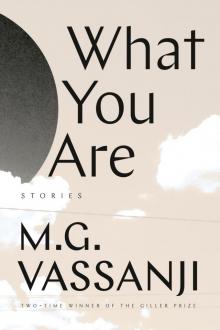 What You Are
What You Are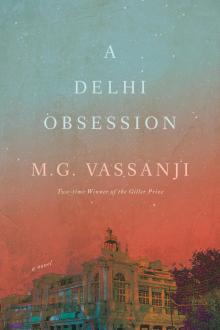 A Delhi Obsession
A Delhi Obsession When She Was Queen
When She Was Queen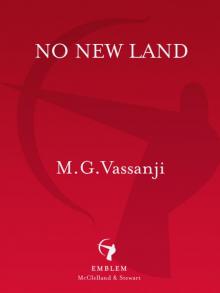 No New Land
No New Land Nostalgia
Nostalgia Mordecai Richler
Mordecai Richler The Book of Secrets
The Book of Secrets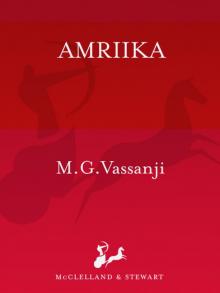 Amriika
Amriika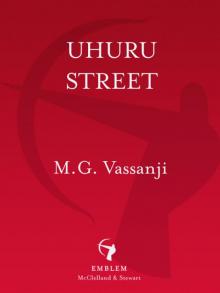 Uhuru Street
Uhuru Street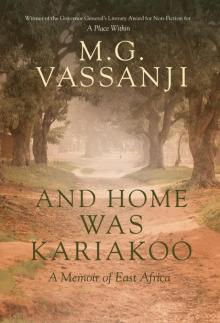 And Home Was Kariakoo
And Home Was Kariakoo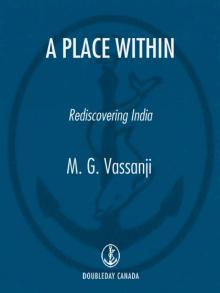 A Place Within
A Place Within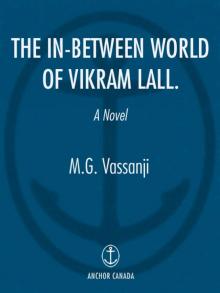 The In-Between World of Vikram Lall
The In-Between World of Vikram Lall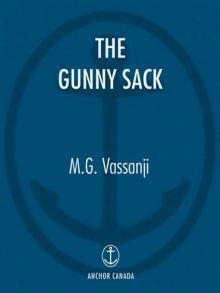 The Gunny Sack
The Gunny Sack